“I last saw him a few months ago. He’d been in and out of the hospital. I knew what the deal was, and he knew what the deal was, and we didn’t talk about it. We talked about what was on our minds: the election, politics, what needed to be done. Ours was a relationship that didn’t need a lot of words.
“Mostly I’ll miss the fun we had. We played lots of pranks on each other. I used to race cars, and after he took this rare Porsche I owned for a drive, he began to get into racing. He had incredible reflexes, and he got really good, but he talked so much about it that I got sick of it.
“So I had a beaten-up Porsche shell delivered to his porch for his 50th birthday. He never said anything, but not long after, I found a crate of molten metal delivered to the living room of my (rented) house. It dented the floor. I then had it turned into a really ugly sculpture and dropped into his garden. To this day, neither one of us has ever mentioned it.” — Robert Redford on his long friendship with Paul Newman in the current Time.
Day: October 2, 2008
Pulling Into Traffic
I have to leave for a black-tie dinner party honoring Appaloosa director Ed Harris in Santa Barbara. Have to be there in time to watch the Biden-Palin debate at 6 pm. Debates are always hyped by the news media, and they almost always disappoint. Biden is going to try to play it genteel and deft; Palin obviously wants to appear a little more secure and knowledgable than she did with Katie Couric the other day. I don’t think much is going to happen. I would love to be wrong.
At A Stroke
“We cannot expect one man to heal every wound, to solve every major crisis of policy. So much of the Presidency, as they say, is a matter of waking up in the morning and trying to drink from a fire hydrant. In the quiet of the Oval Office, the noise of immediate demands can be deafening. And yet Barack Obama has precisely the temperament to shut out the noise when necessary and concentrate on the essential.

“The election of Obama — a man of mixed ethnicity, at once comfortable in the world and utterly representative of twenty-first-century America — would, at a stroke, reverse our country’s image abroad and refresh its spirit at home. His ascendance to the Presidency would be a symbolic culmination of the civil- and voting-rights acts of the nineteen-sixties and the century-long struggles for equality that preceded them. It could not help but say something encouraging, even exhilarating, about the country, about its dedication to tolerance and inclusiveness, about its fidelity, after all, to the values it proclaims in its textbooks.
“At a moment of economic calamity, international perplexity, political failure, and battered morale, America needs both uplift and realism, both change and steadiness. It needs a leader temperamentally, intellectually, and emotionally attuned to the complexities of our troubled globe. That leader’s name is Barack Obama.” — from the New Yorker‘s editorial endorsement, dated 10.13.08 but out on stands today. As if New Yorker readers had to be persuaded.
Killshot Still Jailed
The gist of John Horn‘s 10.2 L.A. Times piece about John Madden‘s Killshot, the release of which has been delayed “at least” five times by the Weinstein Co., is that it will finally come out in January 2009. After sitting around for three years. Why don’t they show it to guys like me, just to get a reaction and see what’s what?
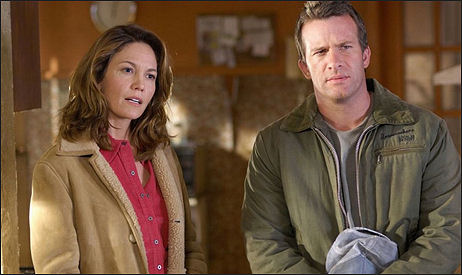
Diane Lane, Thomas Jane in Killshot
The adaptation of Elmore Leonard‘s late ’80s novel stars Thomas Jane, Diane Lane, Mickey Rourke and Joseph Gordon Levitt. Apparently Harvey believes that the heat generated by Rourke’s highly touted performance in Darren Aronofsky‘s The Wrestler (Fox Searchlight, 12.19) will bestow a want-to-see factor.
Little Bailout Boost
If and when the proposed $700-billion bailout is approved by the House tomorrow, Hollywood will receive “tax breaks worth more than $470 million over the next decade for movie and TV producers that shoot in the U.S.,” L.A. Times reporter Richard Verrier wrote last night.
“That’s not a lot of money, given that the average studio movie costs $106.6 million to make and market, but it could keep some low-budget productions — and jobs — from going offshore.
“Hollywood has long sought measures to curb so-called runaway production, which it blames for causing thousands of job losses in Southern California as filmmakers have fled to Canada and other foreign countries that offer cost savings through tax breaks and other incentives.
“Specifically, the legislation would allow filmmakers who shoot in the U.S. to qualify for a tax deduction granted in 2004 to domestic manufacturers that capped the top tax rate at 32% instead of 35%. Additionally, the tax package lifts the budget cap on the existing tax deduction, which was limited to movies that cost less than $15 million to make — in effect excluding most studio films, which cost a lot more.”
Goldstein’s Beef
On 10.1 L.A. Times columnist Patrick Goldstein ran his annual piece about how the Oscar handicapping racket is, as he put it yesterday, “wreaking havoc on high-end movies.” He also said that “the film industry’s obsession with chasing Oscar glory has created an insupportable financial model for quality films and quality filmmakers.”
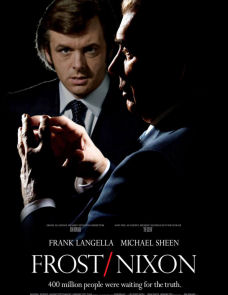
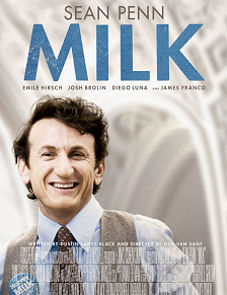
Maybe, maybe not. Half of me agrees but the other half recognizes that Oscar season is gravy time for sites like mine so why should I bite the hand? Why, now that you mention it, is Patrick biting the hand after a fashion? He goes through this weirdness every year. “I write about the politics of Hollywood filmmaking, its key players and, yes, Oscar contenders for a living,” he’s more or less saying, “but I hate the ‘game’ of it — it’s unfair to the less well-funded contenders — so I’m going to call the whole system into question, even though I don’t really want it to change in terms of less studio spending because I need to pay the mortgage.”
I realize my position — it’s not a good system but leave well enough alone — makes me sound like a Bear Sterns executive defending sub-prime loans in 2006, but the getting is good so why pee in the lake? Because the lake — the indie lake — has been drained by too much Oscar-season spending, Goldstein is partly saying. He also seems to be saying that Oscar handicappers speculating now about possible or likely winners and losers are con artists.
He mentions at one point a “Hollywood Elsewhere post where blogger Jeff Wells said ‘a guy’ he knew had heard that Gus Van Sant‘s Milk was a solid contender.” Goldstein was clearly saying this sounded a little thin, and where is the merit or credibility in quoting a “guy” who’s says he knows something? Okay, let’s break it down and review what was actually written and why.
One, I know quite well and trust the taste buds of the guy (an exhibition exec) who passed along the tip about Milk. He knows what he’s talking about, he’s always talking to a very savvy and attuned industry crowd, and I don’t care if this satisfies Goldstein or not. Two, I only brought up the Milk opinion to dispute a passed-along publicist claim in Michael Cieply‘s Oscar-race piece in the 9.28 N.Y. Times that “some publicists who specialize in Oscar campaigns are privately predicting a year-end shootout between Bemjamin Button and Frost/Nixon.” And three, my dispute was (and still is) based upon my not hearing from anyone at all that Frost/Nixon is a “favored Best Picture contender.”

I’m not putting down Frost/Nixon here. I’m just trying to be upfront about what people have been saying about it. It’s said to be a smart, gripping, well-written film with a remarkable lead performance from Frank Langella. I just haven’t heard “definite Best Picture contender,” and certainly not “one of the top two contenders” a la Cieply.
Let’s remember also that the joys of Oscar season aren’t about predictions but convictions. For me it’s not about who wins as much as the impassioned arguments that happen from October through February about who should and shouldn’t be nominated, and then about who should or shouldn’t win. As David Poland said last year , “Each Oscar-season movie is its own little war.” What I love about this game is that they’re not just movie wars — debates about cinematic achievement, values, chops — but sword fights about culture, ethics, moral values, politics. I love these arguments. I live for them.
At the end of the piece, Goldstein asks “what would happen if someone Hollywood holds in high esteem — for example, Clint Eastwood, who has Changeling due later this month — threw his hat out of the ring? What if Clint told Universal to save its money and skip the Oscar campaigning, parties, gushy trade ads and all the other silliness?
“Imagine the hand-wringing if Changeling got just as many award nominations as it would have if it had spent all those millions? That would definitely let all the hot air out of the Oscar balloon. It might also give more quality films an opportunity to compete on a level playing field and actually make some money. It might even push the back the onset of Oscar mania a few months. Come on, Clint, make my day.”
One, I’m told that Universal isn’t spending very much (if anything) this year on online Oscar ads. (What are they going to put their money into, Variety print ads? Is Bill Clinton running against George H.W. Bush?) And two, if Eastwood is as astute as Goldstein and others believe him to be, he’ll be telling Universal to put their efforts behind Angelina Jolie‘s shot at a Best Actress nomination, and leave the Best Picture action to his other film, Gran Torino, which Warner Bros. is releasing in late December. Maybe. If it pans out.
My Gran Torino enthusiasm is obviously blind and meaningless (except for my general faith in Eastwood’s taste and chops), but I’ve seen Changeling and it’s a solid B plus or, if you want to be gracious, A-minus effort. But it’s not an A — not in my view — and it sure isn’t an A-plus, and you really do need to be A-plus to get into the Best Picture game.
Hits Her Peak
This College Humor-produced trailer, an impression of a Disney film about an Alaskan hockey mom who becomes Vice President “in the wackiest family comedy of the year,” went up on 9.25. But the embedded YouTube version only became available today. The piece was inspired by Matt Damon’s quote about Sarah Palin‘s candidacy being something out of a Disney film, or words to that effect.
Objects
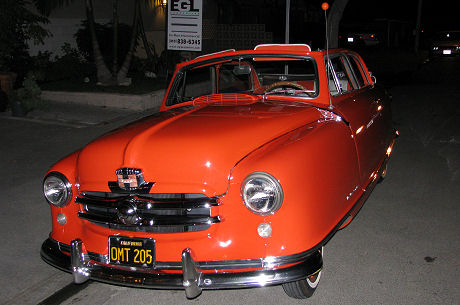
Possibly a 1950 Nash, based on this purported photo of same — Tuesday, 9.30.08, 8:25 pm. Amazing color — orange with a little tutti frutti terra cotta. Here‘s another angle.

Inside the men’s room at Dominick’s on Beverly Blvd. — Wednesday, 10.1.08, 10:40 pm. I’m fine with bathroom erotica but this 1950s Playboy magazine Vargas stuff is puerile.
A Lifetime Ago
I don’t own Con Air (why is that?) but I’ve always loved the double-tracking thing it has going on — a blend of ultra-slick action-movie chops along with an attitude of subversive genre parody. I’ve said before that Con Air is primarily a wickedly funny and (at times) almost surreal conceptual comedy, and secondarily an action thriller. Or is it the other way around?
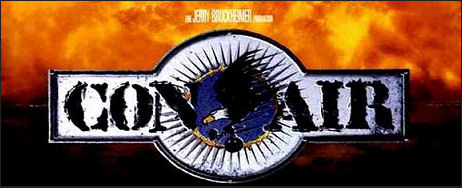
I remember calling it “Hellzapoppin” after I first saw it. A movie that plays the action thriller game — it’s a very handsomely shot and well-edited thing — while mocking and toying with big-budget machismo at every turn. Not in a silly spoof way but using a kind of flip, inside-baseball attitude. As if the people who were paid to put it together — gifted, too-hip-for-the-room writers with jaded nihilist attitudes — felt vaguely befouled for working on a project so caked with cynicism and Hollywood corruption, and decided to inject snide, subversive humor as a form of therapy.
The marvel of Con Air is that the mixture of this attitude with cold action-movie efficiency (this being one of those happy-accident movies that occur every so often) also worked as entertainment because the movie included you in — it made you feel as if you were laughing with it, not at it.
I love John Malkovich’s performance as Cyrus the Virus — every line and body gesture says “this time out I’m a total paycheck whore, but you’ll also notice I’m very good at this sort of dry attitude comedy.” I always chuckle at the buffed-up Nic Cage at his most comically stalwart and sincere. And at John Cusack’s smarty-pants dialogue and his dopey sandal shoes. The body dropping from the sky and landing on the old couple’s car. “Don’t mess with the bunny.” Steve Buscemi defining the word irony. Colm Meaney’s muscle car getting dropped from 2000 feet up. The idiotic Las Vegas plane-crash finale. Ridiculous but all fun, all the time.
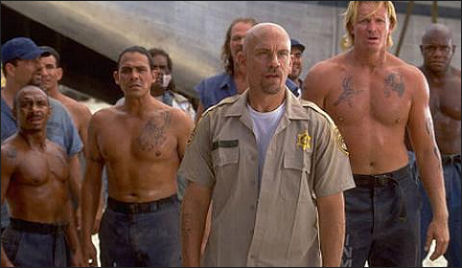
Con Air is a remnant of an era in which Jerry Bruckheimer movies briefly flirted with with this special signature attitude (mocking the big-budget action genre and at the same time kicking ass with it), which partly came from the top-dog writers (Scott Rosenberg was the credited screenwriter but others contributed) he was using back then, partly from Jerry’s own attitude at the time (as he hadn’t yet come into his own and was still working to some extent with the legacy and attitude of late partner Don Simpson ), partly from the Clinton era zeitgeist, partly from the luck of the draw, partly good fortune.
The Jerry Bruckheimer who made this film in ’96-’97 would have howled at the absurdity of making a Lone Ranger movie starring Johnny Depp as Tonto.
l will defend Con Air until the cows come home. It’s expensive guy-movie junk in a sense — one that simultaneously chokes on its own cynicism and yet makes you laugh at the absurdity of making movies of this sort, and yet put together with great care and precision and polish. Bruckheimer used to say I make guy movies but I don’t serve hamburger — I serve first-rate steak. Con Air is like a pricey, perfectly cooked marbled T-bone in a great restaurant in old town Buenos Aires or downtown Chicago or in the east 50s in Manhattan.
I hold Gone in Sixty Seconds and The Rock in the same regard. All three are among my all-time favorite guilty pleasure movies. Those were the days. Jerry doesn’t make ’em like that any more.
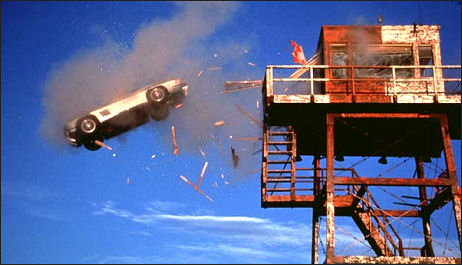
Man of Few Words
“Just saw Body of Lies,” an industry friend wrote last night. “I thought it was a really terrific, smart studio movie for grownups. Very astutely directed with a strong central performance from Leonardo DiCaprio (albeit with unfortunate facial hair – though perhaps needed because he still has serious babyface). Russell Crowe is serviceable as the fatty neo-con who isn’t actually the main villain, which is what I was expecting. Very much the sum of its parts – great script, great director, great cast. Bullseye.”
